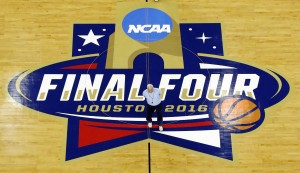On Wednesday, the NCAA Board of Governors adopted a new requirement: Sites bidding on NCAA events must demonstrate that they will provide a safe environment, free of discrimination.
The directive could have a serious impact on North Carolina, which is scheduled to host NCAA tournament games in both 2017 and 2018, and has been the focus of widespread backlash after the recent passage of an anti-LGBT law.
In March, Gov. Pat McCrory (R) signed HB2, a law that blocks North Carolina cities from passing their own non-discrimination ordinances and forces transgender men and women to use the bathroom that aligns with their birth certificate, not their gender identity, into law. Mississippi passed a similar law, scheduled to go into effect on July 1.
While the NCAA statement doesn’t officially mention HB2, the writing on the wall seems clear: If North Carolina doesn’t say goodbye to HB2, it might have to say goodbye to hosting March Madness.
“Currently awarded sites must report how they will provide an environment that is safe, healthy and free of discrimination, plus safeguards the dignity of everyone involved in the event,” the NCAA said in a statement to Andy Katz of ESPN. “The information must be reported to the Board of Governors Ad Hoc Committee to Promote Cultural Diversity and Equity, and full implementation is expected during the current bidding process.’’

The NCAA has historically stuck to its principals once adopting guidelines for hosting neutral-site championship events. Since 2001, the organization hasn’t allowed such events to be held in states where the governments fly the Confederate flag, or at schools using “abusive or offensive” Native American mascots or team names.
“The higher education community is a diverse mix of people from different racial, ethnic, religious and sexual orientation backgrounds,” said Kirk Schulz, president of Kansas State University and chair of the Board of Governors. “So it is important that we assure that community — including our student-athletes and fans — will always enjoy the experience of competing and watching at NCAA championships without concerns of discrimination.”
The fallout from the passage of HB2 has been severe. PayPal abandoned plans for a massive operations center in Charlotte, which would have brought 400 new jobs to the area. Famous musicians, such as Bruce Springsteen, have taken a stand by canceling concerts in the state. Even Donald Trump has expressed his opposition to the measure.
But none of this, so far, has convinced McCrory to change it.
While many sporting leagues have spoken out against the bill, so far, none have officially moved any events out of the state. This week, the legendary Michael Jordan — a North Carolina native who owns the state’s NBA team, the Charlotte Hornets — didn’t denounce the law by name, but did say that the Hornets are “opposed to discrimination in any form.”
Charles Barkley has urged the NBA to move its 2017 All-Star game from Charlotte, and league commissioner Adam Silver said this week that “it would be problematic for us to move forward with our All-Star Game if there is not a change in the law.’’
